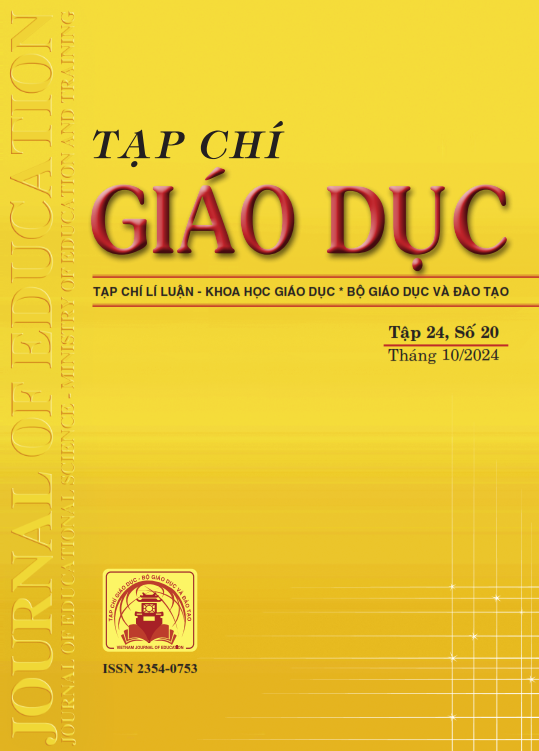Trí tuệ cảm xúc của tăng ni sinh: Nghiên cứu ở Học viện Phật giáo Việt Nam tại Huế
Tóm tắt
Emotional intelligence is a form of general competency that plays an important role in the life and activities of each individual. It is one of the topics of interest among scientists with abundant research on many different subjects and professions in recent decades. Yet there is still no research work that exploits the assessment of Monk and Nun students’ emotional intelligence, which is helpful in easing their psychological struggle in life. This article presents the current status of emotional intelligence among the monk and nun students of the Vietnam Buddhist Institute in Hue. The results showed that their emotional intelligence was above average. Among the components of emotional intelligence, “Happiness” and “Emotional self-control” were rated highest, followed by “Sociability” and “Emotional understanding” as the lowest. These findings are the basis for proposing socio-psychological measures to develop emotional intelligence for monk and nun students.
Tài liệu tham khảo
Anwar, J., & Warraich (2020). Emotional intelligence and academic performance in first and final year medical students: a cross-sectional study. BMC Medical Education, 13, 1-10.
Balluerka, N., Aritzeta, A., Gorostiaga, A., Gartzia, L., & Soroa, G. (2013). Emotional intelligence and depressed mood in adolescence: A multilevel approach. International Journal of Clinical and Health Psychology, 13(2), 110-117.
Bar-On, R. (1997). The Emotional Intelligence Inventory (EQ-i): Technical manual. Toronto, Canada: Multi-Health Systems.
Đỗ Thị Tuyết Mai, Nguyễn Hải Ninh, Nguyễn Thị Anh Thư (2021). Thực trạng về trí tuệ cảm xúc của sinh viên điều dưỡng chính quy Trường Đại học Y Dược Hải Phòng năm 2020. Tạp chí Y học Dự phòng, 31(5), 162-168. https://doi.org/10.51403/0868-2836/2021/367
Đoàn Văn Điều (2014). Khảo sát trí tuệ cảm xác của sinh viên Trường Đại học Sư phạm Thành phố Hồ Chí Minh. Tạp chí Khoa học, Trường Đại học Sư phạm Thành phố Hồ Chí Minh, 54, 69-74.
Doyle, J. N., Campbell, M. A., & Gryshchuk, L. (2021). Resilience: When coping is emotionally intelligent. Journal of the American Psychiatric Nurses Association, 11(2), 101-102.
Goleman, D. (1995). Emotional Intelligence: Why it can matter more than IQ. New York: Bantam Books.
Goleman, D. (2011). Trí tuệ cảm xúc - Làm thế nào để biến những xúc cảm của bạn thành trí tuệ? NXB Trí tuệ.
Lê Thị Huyền Trinh (2020). Mức độ trí tuệ cảm xúc của sinh viên đại học Điều dưỡng chính quy Trường Đại học Điều dưỡng Nam Định. Tạp chí Khoa học và Công nghệ, Đại học Thái Nguyên, 255(4), 86-92.
Mikolajczak, M., Petrides, K. V., Coumans, N., & Luminet, O. (2009). The moderating effect of trait emotional intellig‐ence on mood deterioration following laboratory-induced stress. International Journal of Clinical and Health Psychology, 9, 455-477.
Nguyễn Ngọc Quỳnh Anh (2018). Sức khỏe tâm thần của trẻ vị thành niên Việt Nam. Luận án tiến sĩ Tâm lí học, Đại học Monash, Australia.
Panfil, K., Bailey, C., Davis, I., Mains, A., & Kirkpatrick, K. (2020). A time-based intervention to treat impulsivity in male and female rats. Behavioural Brain Research, 379, Article 112316. https://doi.org/10.1016/j.bbr. 2019.112316
Petrides, K. V. (2011). Trait Emotional Intelligence Questionnaire - Short form, TEIQue-SF. https://www.psychometriclab.com/adminsdata/files/The%20TEIQue-SF%20v.%201.50.pdf
Petrides, K. V. (2009). Trait emotional intelligence theory. Industrial and Organizational Psychology, 3(2), 136-139.
Petrides, K. V., & Furnham, A. (2005). Trait emotional intelligence profiles of students from different university faculties. Australian Journal of Psychology, 62(1), 51-57.
Prayde, M., Walraven, K., Karki, N., &Flaherty (2015). Emotional Intelligence of Youth Accessing Residential and Day Treatment Programs: Association with Psychological and Interpersonal Difficulties. Depression & Anxiety, 4(4), 2167-1044.
Salovey, P., Mayer, J. D., Goldman, S., Turvey, C., & Palfai, T. (1995). Emotional attention, clarity, and repair: Exploring emotional intelligence using the Trait Meta - Mood Scale. In J. W. Pennebaker (Ed.), Emotion, disclosure, and health (pp. 125-154). Washington, DC American Psychological Association.
Sanchez-Ruiz, M. J., Pérez-González, J. C., & Petrides, K. V. (2010). Trait emotional intelligence profiles of students from different university faculties. Australian Journal of Psychology, 62(1), 51-57. https://doi.org/10.1080/ 00049530903312907
Stamatopoulou, M., Galanis, P., & Prezerakos, P. (2016). Psychometric properties of the Greek translation of the Trait Emotional Intelligence Questionnaire-Short Form (TEIQue-SF). Personality and Individual Differences, 95, 80-84.
Trí Quang (2010). Tổng tập Giới pháp xuất gia (tập 1). NXB Văn hoá Sài Gòn.
Tải xuống
Đã Xuất bản
Cách trích dẫn
Số
Chuyên mục
Giấy phép

Tác phẩm này được cấp phép theo Ghi nhận tác giả của Creative Commons Giấy phép quốc tế 4.0 .












